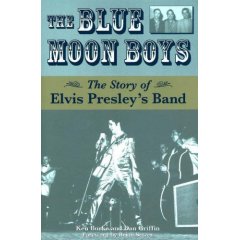
If it weren’t for Scotty Moore, Bill Black, and DJ Fontana, you never would have heard of Elvis Presley. They are well known among rockabilly fans, rock historians, and record geeks, but to the general population and even some Elvis fans, the mention of their names will get an immediate response of “Who?” This book is unlikely to change that, but those of us in the former categories should be happy to learn more about these guys.
Scotty Moore and Bill Black were part-time bar-band musicians until Sam Phillips encouraged them to jam with some funny-looking kid named Elvis. Together they created “That’s All Right Mama,” which led to a few years of greatness before the evil Colonel Parker came along and ruined everything.
That’s where guitarist Moore, bassist Black, and drummer Fontana disappear from most history books. But in this book, that’s where the story gets interesting. I really liked getting a glimpse of the personalities behind the historical names. After their split from Elvis, they all took slightly different paths but remained close and occasionally collaborated. Fontana (who has a really cool name) was a professional drummer before the Elvis gig simply continued being a professional drummer and toured with Gene Vincent and Lefty Frizzell l before becoming a Nashville session player. Bill Black (who also had a cool name) became the first bass player in history to leave a successful band for a legitimate solo career. He had several decent-sized instrumental hits with the Bill Black Combo. As far as I know, the only other instance of “second-career bassist syndrome” occurred when Paul McCartney left the Beatles. If you want to be snarky about it and bring Peter Cetera and Sting into the discussion, you will only bring shame upon yourself.
Scotty Moore, being the cost complex character in the story, gets the most page time here. He becomes an embittered, reclusive studio engineer/producer who ends up selling all of his guitars and hitting the booze once in a while. For the most part, he prefers to maintain his privacy and therefore his dignity.
The third act in this drama involves the rediscovery of Scotty Moore and DJ Fontana by rockabilly revivalists in the 80’s and 90’s (Bill Black died of a brain tumor in 1965). They also receive much belated praise from big rock stars and those “give-em-an-award-before-they-die” type organizations. Moore and Fontana, separately and together, become involved in several projects that they hope will finally get them the recognition they deserve. When these projects, like the “All The King’s Men” CD fail to set the world on fire, the disappointment leads to more bitterness. In fact, the relative failure of “All The Kings Men” led to a falling out with co-author Griffin who not only produced the CD, but also acted as their manager for a while. The book is not a hatchet job by any means. The subjects are regarded with respect throughout, but they probably still won’t like it simply because they are naturally cantankerous old coots.
If you like a little dirt and sleaze with your rock and roll reading material, you’ll find a few road stories to keep your interest. You will learn that, when they were touring with Elvis, that the drummer was the real hound dog of the group. DJ Fontana’s penis was known as “The Monster” among his contemporaries.
Other than stories of Elvis’s poor personal hygiene, that’s as dirty as gets.
One thing that slightly bothered me was the unfair treatment of Elvis tribute artist Ronnie McDowell. The authors seem befuddled by Moore and Fontana’s preference to occasionally perform with McDowell and his band rather than be the subjects of the sycophantic hero worship of serious music geeks (Fontana calls them "gurms"). The authors obviously don’t like McDowell and go too far in bad-mouthing him. What they might not understand is that Moore and Fontana might simply enjoy playing with a singer that sounds as good as Elvis but doesn’t have all the weird psychological quirks. Maybe they just prefer being sidemen and not the center of attention. They don't see themselves as legends - just musicians.
Leave a comment